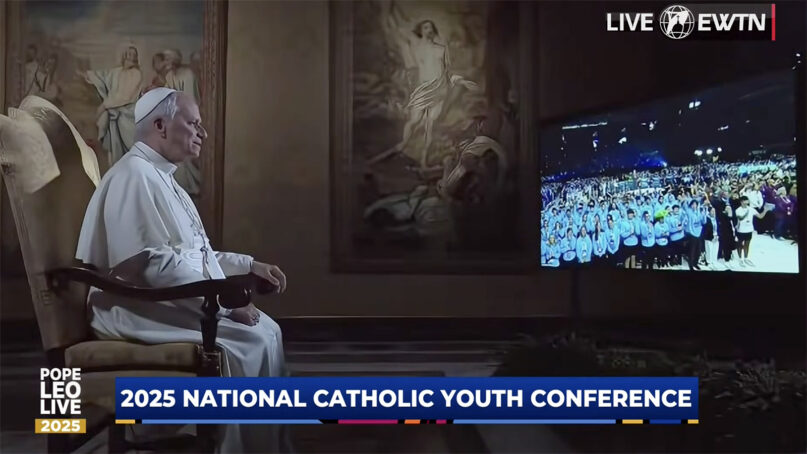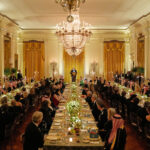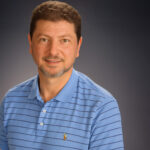VATICAN CITY (RNS) — Pope Leo XIV addressed Artificial Intelligence, polarization and spiritual questions during a live event on Friday (Nov. 21), broadcast to over 16,000 U.S. Catholic teenagers gathered at the Lucas Oil Stadium in Indianapolis, Indiana, for the National Catholic Youth Conference.
Organizers described the event as the “first digital visit to the United States” by the pontiff, who was born in Chicago, Illinois. Leo could be seen smiling as the roaring crowd welcomed him for the online event. Five young people took turns asking questions to the pope, with Catholic speaker and podcast host Katie Prejean McGrady moderating the conversation.
The tone was informal and direct, with the pope even joking that he only wears white socks — a nod to his favorite Chicago baseball team — and that he uses a different opening word for The New York Times Wordle game every time.
Micah Alcisto, from Honolulu, Hawaii, admitted to using AI programs like ChatGPT to write essays and perform tasks and asked Leo, who has shown a keen interest in this emerging technology during his first six months as pontiff, how young people should engage with AI.
“AI is becoming one of the defining features of our time,” the pope said, but raised concerns about how this technology is taking agency and critical abilities away from people, especially the young. While stressing that AI “cannot replace human intelligence,” he also underlined the importance that young people develop critical thinking abilities.
“Don’t ask it to do your homework for you!” he said, encouraging the crowd to use AI so that “if it disappeared tomorrow, you would still know how to think and form friendships.”

Pope Leo XIV, in Vatican City, addresses the National Catholic Youth Conference on Friday, Nov. 21, 2025, at the Lucas Oil Stadium in Indianapolis, Indiana. (Video screen grab)
While the pope praised the power that AI has to develop solutions and provide tools for humankind, he also warned that it “cannot judge from what is truly right and wrong, and it will not stand in authentic wonder before the beauty of truth and creation.”
“AI cannot replace the unique gift that you are to the world,” he added.
Leo also addressed smartphones and the endless scrolling of social media platforms, in answer to a question by Christopher Pantelakis from Mesquite, Nevada. While acknowledging that the virtual event could not have taken place without the connecting power of the internet, the pope stressed that the online world “can never replace real, in-person relationships.”
He presented the recently sainted Carlo Acutis, an Italian youth who died in 2006 of leukemia at the age of 15, as an example of how to balance technology with faith, and relationships with others, especially with the poor. “Be intentional with your screen time. Make sure technology serves your life and not the other way around,” he said.
“Pray for the gift of true friends — someone who helps you grow closer to Jesus and encourages you to be a better person,” he said.
Asked by Mia Smothers from Joppa, Maryland, about how to handle mistakes, Leo said that “in truth, none of us is perfect,” but that fortunately Jesus “will always welcome you home.”
Answering a question about the future of the church in the United States, Leo reflected on the history of Catholicism’s efforts to remain relevant in the world through councils and gatherings. He said the current consultation of Catholics around the world, known as synodality, hopes to engage everyone in drawing the path forward.
“You are not only the future of the church, you are the present. Your voices, your ideas, your thoughts matter right now! The church needs you, what you have been given, to share with all of us,” he said.
Leo also laid out the future that he sees for the church and for Catholics. He dismissed philosophies that promote only “things that make you feel good, or comfortable.” Drawing from the writings of St. Augustine, the namesake of the pope’s religious order, Leo stressed the importance of growing a sincere and authentic faith.
“Jesus also calls his disciples to be peacemakers,” the pope said, urging Catholics to be “people who build bridges instead of walls, people who value dialogue and unity instead of division.”
Leo also spoke into the widening partisan divides of the U.S., telling the young Catholics to beware of over-identifying their faith with any political party.
“Please be careful not to use political categories to speak of faith or the church. The church doesn’t belong to any political party. Rather she helps form your conscience so you can think and act with wisdom and love,” he said.
The pope’s words were followed by a standing ovation. The young people who asked the pope the questions stood to take a selfie with Leo on the maxi-screen. Prejean McGrady invited the crowd to continue the conversation by sending written questions to the papal representative to the U.S., Cardinal Christophe Pierre.
Archbishop Nelson J. Pérez, of Philadelphia, voiced the hope for a visit of the American pope to the U.S. in the near future.



